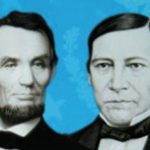Wherefore Art Thou, Romero?
By Mark Sconce
 |
 |
Those who read my February book review of Michael Hogan’s Abraham Lincoln and Mexico may remember the name Matías Romero. I described him as a young envoy sent by Mexican president Benito Juárez to meet and influence the new president, Abraham Lincoln. Now let’s turn the microscope a notch so we can see this Mexican gentleman more clearly.
The year was 1861. Just elected president, Abe Lincoln was enjoying a final farewell party with his Springfield, Illinois supporters, friends and neighbors. Just imagine the scene: a happy gathering of “homespun farmers in their hickory shirts and pantaloons tucked into boots,” wrote one witness. When suddenly appears a dapper three-piece silk suit with a refined manner and a very black beard. Enter Matías Romero, there to deliver the official diplomatic congratulations and good tidings from the Republic of Mexico. It was likely the first time that Abraham Lincoln saw a Mexican and especially one bearing good wishes after the terrible results of “Polk’s Little War” of 1848 that virtually bifurcated Mexico and deeply shamed the Mexican people.
Romero’s visit must have reminded Lincoln of his own deep opposition to the armed invasion of a neighboring republic. He was disposed to treat this young man well and to hear him out. Mary Todd Lincoln was equally impressed with his youthful politesse. After she and the President got settled in Washington, Romero presented himself at the White House and was welcomed as the new Ambassador of Mexico. As the violent storm of secession gathered in the South, President Lincoln had little time to take Mary Todd on her frequent shopping trips. Romero graciously offered to squire her around the better fashion stores in the nation’s capital, “a duty which Lincoln was happy to relinquish,” writes Dr. Hogan.
During these trips and even in the family quarters, Romero brought the Lincolns up-to-speed on events and conditions in Mexico. Perhaps in response, Lincoln introduced him to important military leaders including Gens. Grant and Philip Sheridan, “connections that would later prove crucial to the Mexican struggle.” Romero even helped Gen. Grant practice his Spanish.
The most pressing issue was French occupation forces conquering Mexico in 1863 and installing a monarchy. President Juárez fled Mexico City and set up a government in exile near El Paso. Romero emphasized that Mexico and the U.S. shared the stated intent of the Monroe Doctrine, namely, to stop further European colonization in the Western Hemisphere. Agreed on this point, Lincoln and his administration refused to recognize the French monarch whom Napoleon installed.
Another pressing problem for Mexico was a nearly empty treasury drained by wars and civil strife. President Juárez was in no position to raise taxes, yet badly needed to provide for his struggling soldiers. Wherefore art thou, Romero? In no time, resourceful Romero used Lincoln’s note of support to raise $18 million from East Coast bankers to aid the Mexican cause. Modern arms and ammunition somehow appeared at convenient caches along the border for Juárez’s troops to retrieve and deploy made possible by a surplus of armaments as the Civil War drew to a close.
Romero’s list of important American contacts grew. Dr. Hogan includes in his Appendix a fulsome invitation to dine with some of America’s most influential leaders in politics, business and cultural affairs. Wishing to give public testimony to Romero’s good works, they proposed “A dinner at such time as may suit your convenience.” You may recognize some of the signers: William Cullen Bryant, Henry Ward Beecher and, of course, Theodore Roosevelt.
Romero served successive administrations after Lincoln’s assassination and finally returned home to become the Minister of Hacienda (Treasury Secretary) and a strong proponent of foreign investment in Mexico especially for growth in the railway sector. Under President Porfirio Díaz, Romero was named ambassador extraordinaire and toured Europe meeting leaders from many countries. After nearly 30 years in service to his country as diplomat, public servant, author, politician, he died in New York City in 1898. Summing up his time in service, he wrote what should be our understanding to this very day.
“The United States is better situated than any other to avail themselves of the immense wealth of Mexico. Being a nation next to our own . . . and being inferior to no other people in riches, activity, intelligence and enterprising spirit, are called by nature to develop the great resources of Mexico. … When we shall have arrived at that situation, our common political and civil interests will give us a common policy, entirely continental and American, which no European nation will misunderstand with impunity.”
It’s a great story, much of it in the archival papers of Romero stored in the vaults of the Banco Nacional de México. Finding and unearthing the journals, letters, diaries and documents of this great man must have seemed akin to an archaeological dig for Dr. Hogan. Puts me in mind of that moment in 1922 when Howard Carter first peered into the dark tomb of Pharaoh Tutankhamun, candle held high. “Can you see anything?” Lord Carnarven impatiently asked. “Yes, wonderful things,” Carter replied.
(Ed. Note: Abraham Lincoln and Mexico by Michael Hogan is available at La Nueva Posada and Diane Pearl’s in Ajijic and Sandi’s Books in Guadalajara. Also available on-line at Amazon.com.)
- April 2024 – Issue - March 31, 2024
- April 2024 – Articles - March 31, 2024
- April 2024 - March 31, 2024









